人教版高中必修三Unit 5 The Value of Money 单元知识清单(含词汇语法练习题及书面表达)
文档属性
| 名称 | 人教版高中必修三Unit 5 The Value of Money 单元知识清单(含词汇语法练习题及书面表达) |
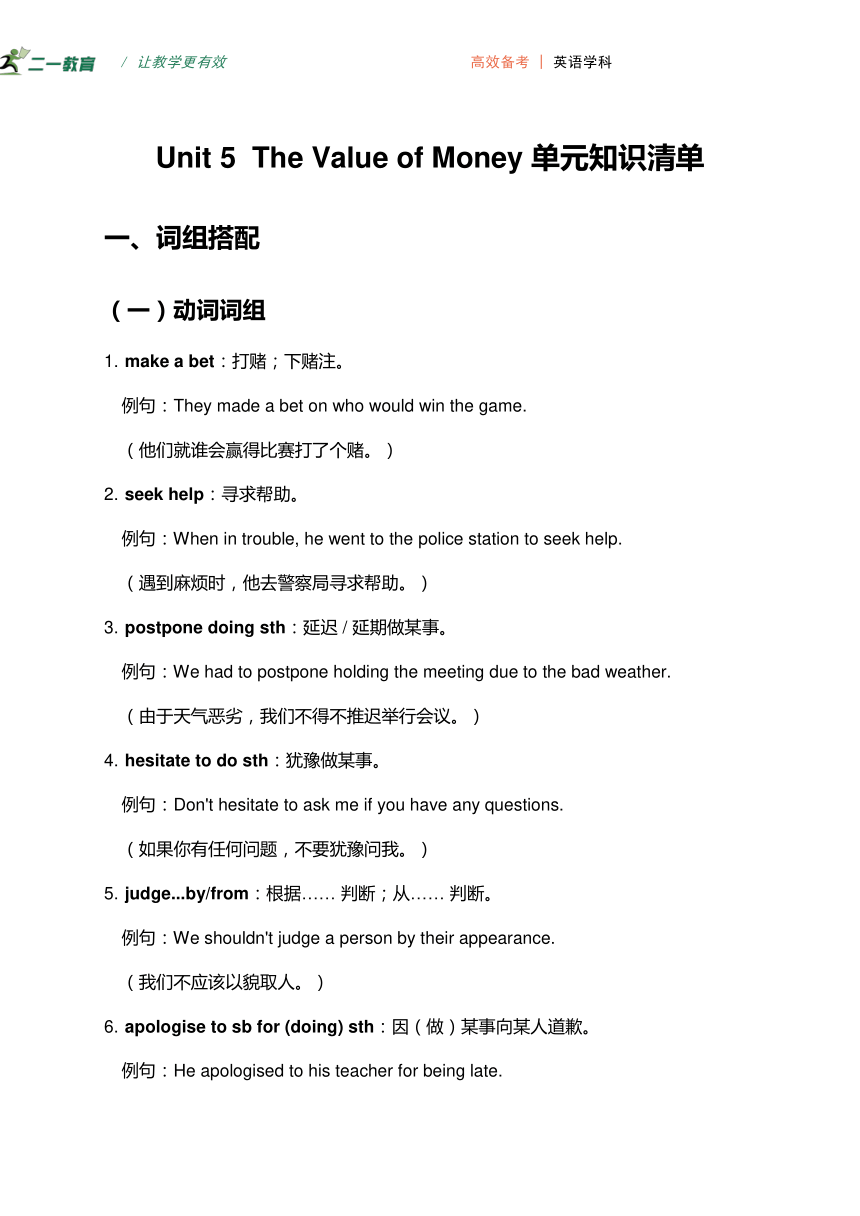
|
|
| 格式 | docx | ||
| 文件大小 | 42.1KB | ||
| 资源类型 | 试卷 | ||
| 版本资源 | 人教版(2019) | ||
| 科目 | 英语 | ||
| 更新时间 | 2025-07-13 00:00:00 | ||
图片预览

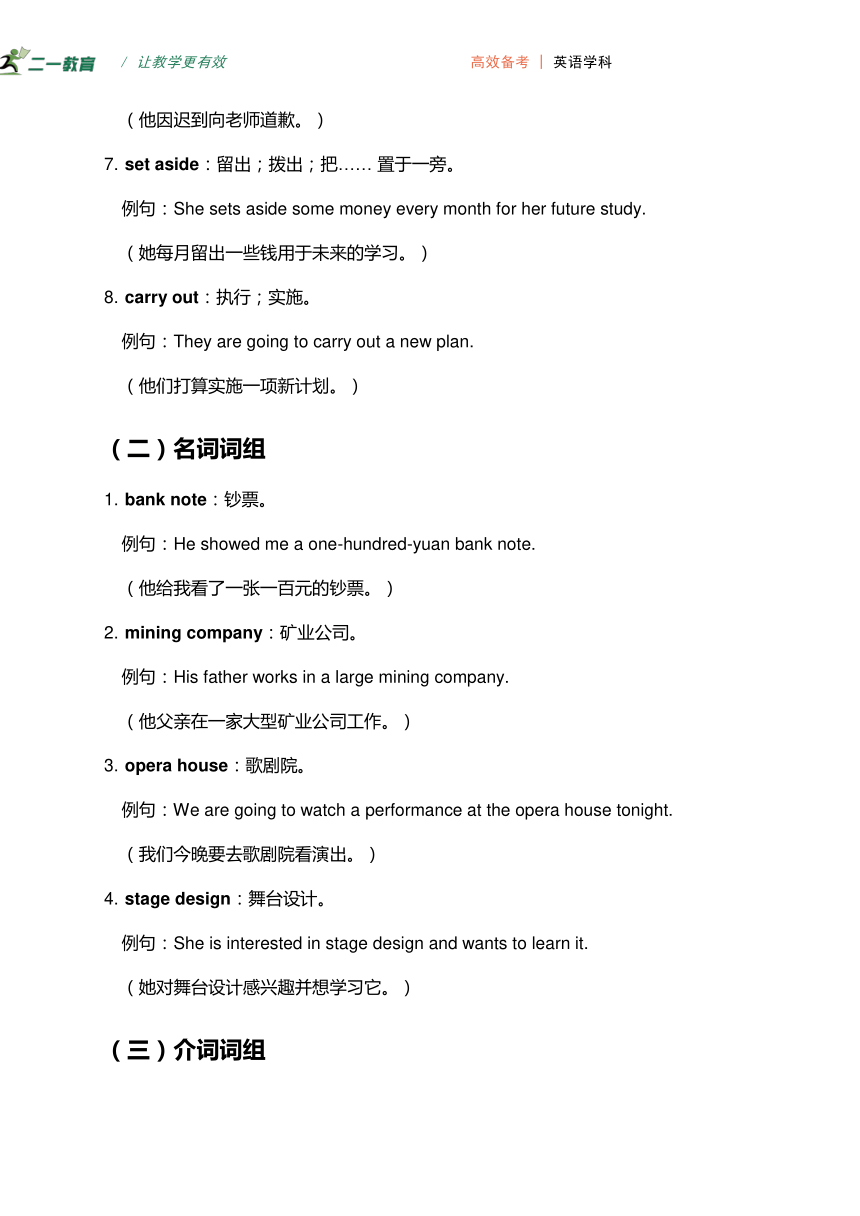
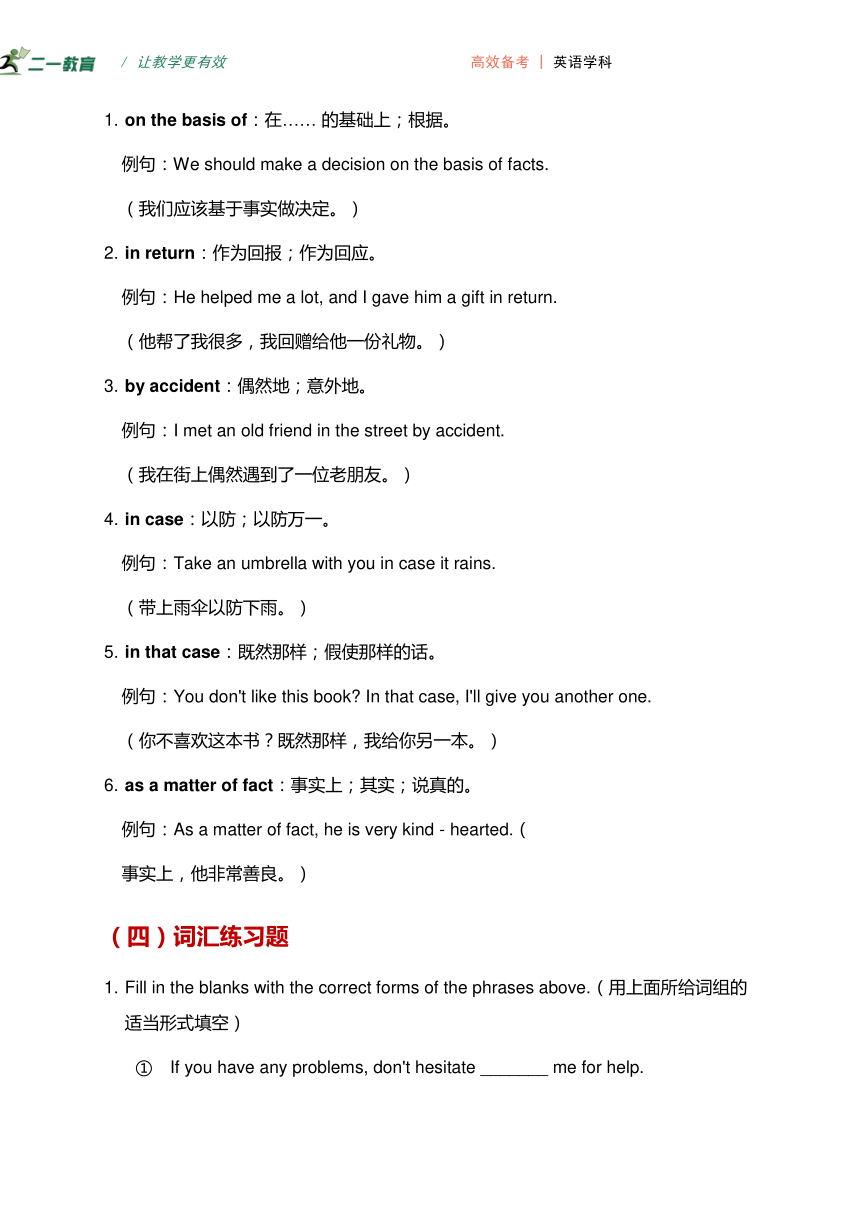
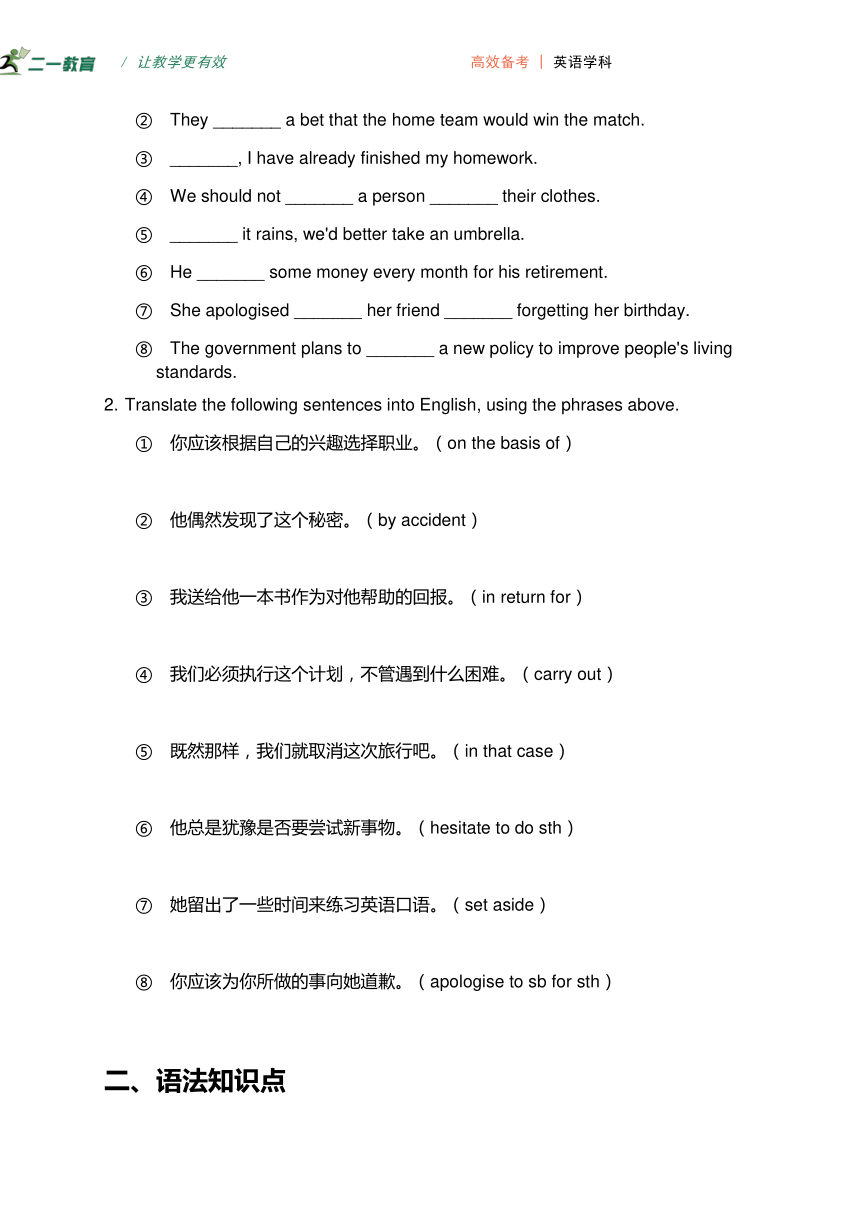
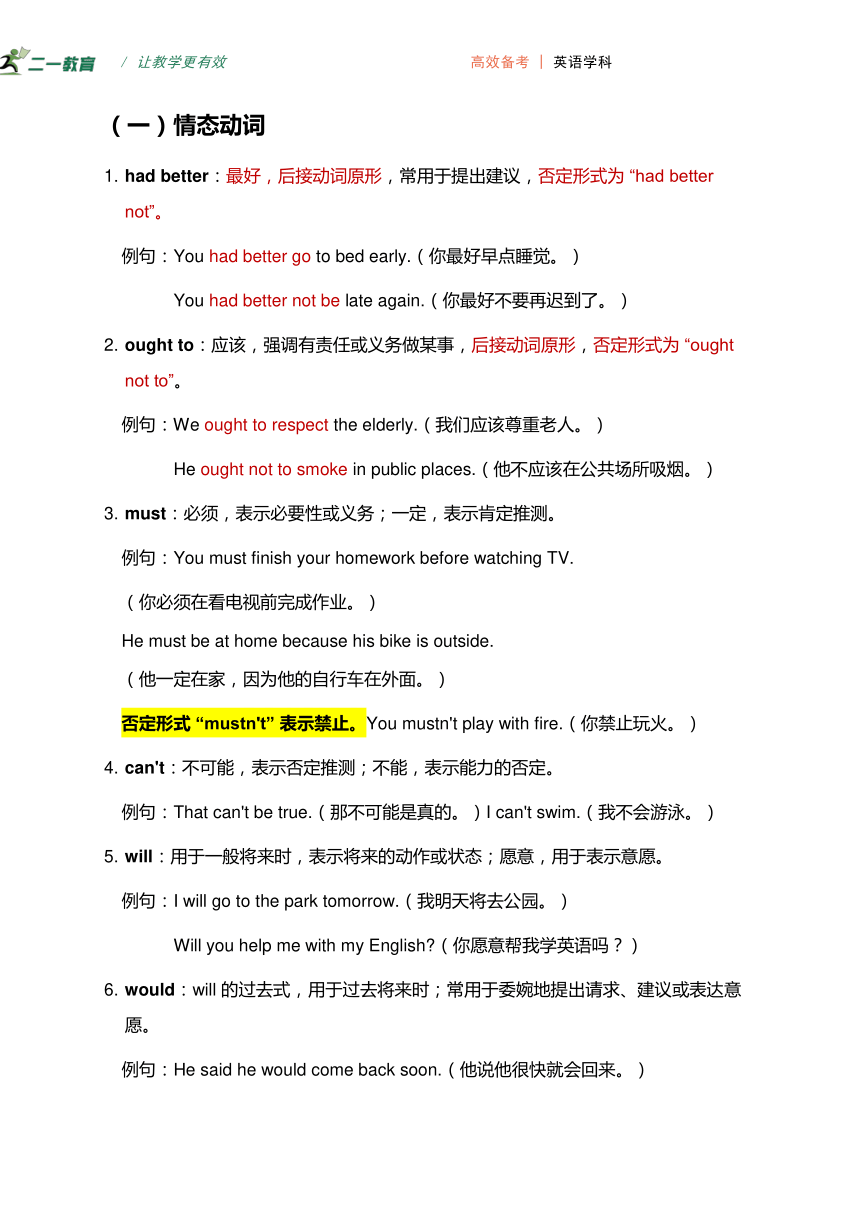
文档简介
/ 让教学更有效 高效备考 | 英语学科
Unit 5 The Value of Money 单元知识清单
一、词组搭配
(一)动词词组
make a bet:打赌;下赌注。
例句:They made a bet on who would win the game.
(他们就谁会赢得比赛打了个赌。)
seek help:寻求帮助。
例句:When in trouble, he went to the police station to seek help.
(遇到麻烦时,他去警察局寻求帮助。)
postpone doing sth:延迟 / 延期做某事。
例句:We had to postpone holding the meeting due to the bad weather.
(由于天气恶劣,我们不得不推迟举行会议。)
hesitate to do sth:犹豫做某事。
例句:Don't hesitate to ask me if you have any questions.
(如果你有任何问题,不要犹豫问我。)
judge...by/from:根据…… 判断;从…… 判断。
例句:We shouldn't judge a person by their appearance.
(我们不应该以貌取人。)
apologise to sb for (doing) sth:因(做)某事向某人道歉。
例句:He apologised to his teacher for being late.
(他因迟到向老师道歉。)
set aside:留出;拨出;把…… 置于一旁。
例句:She sets aside some money every month for her future study.
(她每月留出一些钱用于未来的学习。)
carry out:执行;实施。
例句:They are going to carry out a new plan.
(他们打算实施一项新计划。)
(二)名词词组
bank note:钞票。
例句:He showed me a one-hundred-yuan bank note.
(他给我看了一张一百元的钞票。)
mining company:矿业公司。
例句:His father works in a large mining company.
(他父亲在一家大型矿业公司工作。)
opera house:歌剧院。
例句:We are going to watch a performance at the opera house tonight.
(我们今晚要去歌剧院看演出。)
stage design:舞台设计。
例句:She is interested in stage design and wants to learn it.
(她对舞台设计感兴趣并想学习它。)
(三)介词词组
on the basis of:在…… 的基础上;根据。
例句:We should make a decision on the basis of facts.
(我们应该基于事实做决定。)
in return:作为回报;作为回应。
例句:He helped me a lot, and I gave him a gift in return.
(他帮了我很多,我回赠给他一份礼物。)
by accident:偶然地;意外地。
例句:I met an old friend in the street by accident.
(我在街上偶然遇到了一位老朋友。)
in case:以防;以防万一。
例句:Take an umbrella with you in case it rains.
(带上雨伞以防下雨。)
in that case:既然那样;假使那样的话。
例句:You don't like this book In that case, I'll give you another one.
(你不喜欢这本书?既然那样,我给你另一本。)
as a matter of fact:事实上;其实;说真的。
例句:As a matter of fact, he is very kind - hearted.(
事实上,他非常善良。)
(四)词汇练习题
Fill in the blanks with the correct forms of the phrases above.
(用上面所给词组的适当形式填空)
If you have any problems, don't hesitate _______ me for help.
They _______ a bet that the home team would win the match.
_______, I have already finished my homework.
We should not _______ a person _______ their clothes.
_______ it rains, we'd better take an umbrella.
He _______ some money every month for his retirement.
She apologised _______ her friend _______ forgetting her birthday.
The government plans to _______ a new policy to improve people's living standards.
Translate the following sentences into English, using the phrases above.
你应该根据自己的兴趣选择职业。(on the basis of)
他偶然发现了这个秘密。(by accident)
我送给他一本书作为对他帮助的回报。
(in return for)
我们必须执行这个计划,不管遇到什么困难。
(carry out)
既然那样,我们就取消这次旅行吧。
(in that case)
他总是犹豫是否要尝试新事物。
(hesitate to do sth)
她留出了一些时间来练习英语口语。
(set aside)
你应该为你所做的事向她道歉。
(apologise to sb for sth)
二、语法知识点
(一)情态动词
had better:最好,后接动词原形,常用于提出建议,否定形式为 “had better not”。
例句:You had better go to bed early.(你最好早点睡觉。)
You had better not be late again.(你最好不要再迟到了。)
ought to:应该,强调有责任或义务做某事,后接动词原形,否定形式为 “ought not to”。
例句:We ought to respect the elderly.(我们应该尊重老人。)
He ought not to smoke in public places.(他不应该在公共场所吸烟。)
must:必须,表示必要性或义务;一定,表示肯定推测。
例句:You must finish your homework before watching TV.
(你必须在看电视前完成作业。)
He must be at home because his bike is outside.
(他一定在家,因为他的自行车在外面。)
否定形式 “mustn't” 表示禁止。You mustn't play with fire.(你禁止玩火。)
can't:不可能,表示否定推测;不能,表示能力的否定。
例句:That can't be true.(那不可能是真的。)I can't swim.(我不会游泳。)
will:用于一般将来时,表示将来的动作或状态;愿意,用于表示意愿。
例句:I will go to the park tomorrow.(我明天将去公园。)
Will you help me with my English (你愿意帮我学英语吗?)
would:will 的过去式,用于过去将来时;常用于委婉地提出请求、建议或表达意愿。
例句:He said he would come back soon.(他说他很快就会回来。)
Would you like some tea (你想喝点茶吗?)
may:可以,表示许可;可能,表示可能性。
例句:May I use your pen (我可以用你的笔吗?)
It may rain tomorrow.(明天可能会下雨。)
might:may 的过去式,用于过去时中表示许可或可能性;也可用于现在时,比 “may” 更委婉地表示可能性。
例句:He asked if he might borrow my book.(他问他是否可以借我的书。)
It might be a good idea.(这也许是个好主意。)
can:能;会,表示能力;可以,表示许可。
例句:She can speak English fluently.(她能流利地说英语。)
Can I have a look at your book (我可以看看你的书吗?)
could:can 的过去式,用于过去时中表示能力或许可;也可用于现在时,比 “can” 更委婉地提出请求或表达可能性。
例句:When I was young, I could run very fast.(我年轻时能跑得很快。)
Could you please pass me the salt (你能递给我盐吗?)
(二)练习题
Fill in the blanks with suitable modal verbs.
You _______ be careful when crossing the road.
_______ I borrow your dictionary Mine is at home.
He _______ not be at school today. I saw him in the park just now.
It _______ rain later, so take an umbrella with you.
We _______ start early tomorrow if we want to arrive on time.
_______ you like to come to my birthday party this Saturday
She _______ speak three languages: English, French and Chinese.
You _______ not eat too much junk food. It's bad for your health.
Translate the following sentences into English, using modal verbs.(用情态动词翻译下面句子)
你最好按时完成作业。
我们应该遵守交通规则。
那不可能是玛丽,她去上海了。
明天我可能会去图书馆。
你能帮我搬一下这个箱子吗?
他说他会在一个小时后回来。
我可以在这里吸烟吗?不,你不可以。
三、重要句式句型分析
(一)强调句
结构:It is/was + 被强调部分 (通常是主语、宾语或状语)+ that/who/whom + 其他部分。
当被强调部分是人时,可用 who(主语)、whom(宾语)或 that 连接;
当被强调部分是事物时,用 that 连接,且 that 不可省略。
功能:突出强调句子的某一成分。
例句:It was Tom who/that broke the window.(是汤姆打破了窗户。)
被强调部分是主语 “Tom”。
It was the book that I bought yesterday.(我昨天买的是这本书。)
被强调部分是宾语 “the book”。
It was in the park that we met for the first time.(我们第一次见面是在公园。)
被强调部分是地点状语 “in the park”。
(二)倒装句
否定词或词组位于句首时的倒装:当 never, not, hardly, little, seldom, in no case, by no means 等否定词或词组放在句首时,句子要用部分倒装,即将助动词、情态动词或 be 动词提到主语前面。
例句:Never have I seen such a beautiful view.(我从未见过如此美丽的景色。)Hardly had he arrived when it began to rain.(他一到就开始下雨了。)
here, there, now, then 等副词位于句首,且主语是名词时的倒装:此时句子要用全部倒装,即把谓语动词提到主语前面。
例句:Here comes the bus.(公共汽车来了。)
There goes the bell.(铃响了。)
(三)翻译练习题
是她在我困难的时候帮助了我。
我从来没听说过这么奇怪的故事。
直到他告诉我,我才知道这个消息。
看!孩子们来了。
他不仅会唱歌,还会跳舞。(not only...but also... 位于句首时,not only 后的句子要部分倒装)
四、单元书面表达写作指导
(一)重要词汇词组搭配积累
金钱与财富相关词汇:money, wealth, rich, poor, bank note, loan, charity, fortune
态度与行为相关词汇:judge, respect, ignore, apologise, hesitate, seek, offer, accept
事件描述相关词汇:bet, accident, scene, plot, character, performance
词组搭配:make a bet, on the basis of, in return, by accident, in case, as a matter of fact, set aside, carry out
(二)高分句式积累
It is + adj. + for sb. to do sth.
例句:It is important for us to have a correct attitude towards money.
(对我们来说,对金钱有正确的态度很重要。)
What's more, ...
例句:He is hard - working. What's more, he is very kind.
(他很勤奋。而且,他非常善良。)
In my opinion, ...
例句:In my opinion, money is not the most important thing in life.
(在我看来,钱不是生活中最重要的东西。)
Not only...but also...
例句:She is not only good at English but also 精通 maths.
(她不仅擅长英语,还精通数学。)
As far as I'm concerned, ...
例句:As far as I'm concerned, we should help others without expecting anything in return.(就我而言,我们应该帮助他人而不期望任何回报。)
(三)参考范文
The Value of Money
Money plays an important role in our daily life. It can help us buy the things we need and improve our living standards. However, money is not everything.
In my opinion, we should not be too crazy about money. We should earn money through honest work and use it properly. Money can't buy happiness, love and friendship. For example, Chen Liyan in the news report returned the lost money although she was in need. She didn't care about the money but cared about her honesty. This is the real value we should pursue.
In conclusion, we should have a correct attitude towards money. We should be the master of money rather than its slave, and use it to make our life and the world better.
答案及解析
一、词组搭配练习题答案及解析
1.用上面所给词组的适当形式填空
答案:to seek
解析:“hesitate to do sth” 为固定搭配,表示 “犹豫做某事”,此句表达 “如果你有任何问题,不要犹豫向我寻求帮助”,所以应填 “to seek” 。
答案:made
解析:“make a bet” 表示 “打赌;下赌注”,句子描述过去发生的事情,需用一般过去时,“make” 的过去式是 “made”,即 “他们打了个赌,赌主队会赢得比赛” 。
答案:As a matter of fact
解析:“as a matter of fact” 意为 “事实上;其实;说真的”,在句中作状语,用于引出与之前想法或陈述不同的实际情况,此句 “事实上,我已经完成了我的作业”,符合该词组的用法 。
答案:judge; by/from
解析:“judge...by/from” 表示 “根据…… 判断;从…… 判断”,“我们不应该以貌取人”,这里 “by/from” 后接 “their clothes”,表示判断的依据 。
答案:In case
解析:“in case” 表示 “以防;以防万一”,引导目的状语从句,“以防下雨,我们最好带上雨伞”,符合该词组在句子中表达预防某种情况发生的语境 。
答案:sets aside
解析:“set aside” 有 “留出;拨出;把…… 置于一旁” 的意思,句子描述的是习惯性动作,用一般现在时,主语 “He” 是第三人称单数,所以 “set” 要用第三人称单数形式 “sets”,即 “他每月留出一些钱用于退休” 。
答案:to; for
解析:“apologise to sb for (doing) sth” 为固定搭配,意为 “因(做)某事向某人道歉”,“她因忘记朋友的生日而向朋友道歉”,“to” 后接道歉对象,“for” 后接道歉原因 。
答案:carry out
解析:“carry out” 表示 “执行;实施”,“政府计划实施一项新政策来提高人民的生活水平”,“plan to do sth” 结构中,“to” 后接动词原形,所以填 “carry out” 。
2.翻译句子
答案:You should choose your career on the basis of your own interests.
解析:“应该” 用 “should”,“选择职业” 是 “choose your career”,“根据” 使用 “on the basis of”,“你自己的兴趣” 翻译为 “your own interests”,按照英语语序组合成句 。
答案:He discovered the secret by accident.
解析:“发现” 用 “discover”,句子时态用一般过去时,“discover” 的过去式是 “discovered”;“偶然地” 用 “by accident”,作方式状语,置于句末 。
答案:I gave him a book in return for his help.
解析:“给某人某物” 用 “give sb sth”,句子时态为一般过去时,“give” 的过去式是 “gave”;“作为回报” 用 “in return for”,后接 “his help”,表示回报的原因 。
答案:We must carry out this plan no matter what difficulties we meet.
解析:“必须” 用 “must”,“执行计划” 是 “carry out the plan”;“不管遇到什么困难” 用 “no matter what difficulties we meet”,作让步状语,补充说明执行计划的条件 。
答案:In that case, let's cancel this trip.
解析:“既然那样” 直接用 “in that case”,位于句首,首字母大写;“取消这次旅行” 翻译为 “cancel this trip”,“let's” 后接动词原形 。
答案:He always hesitates to try new things.
解析:“总是” 用 “always”,句子时态为一般现在时,主语 “He” 是第三人称单数,“hesitate” 要用第三人称单数形式 “hesitates”;“犹豫做某事” 是 “hesitate to do sth”,“尝试新事物” 翻译为 “try new things” 。
答案:She set aside some time to practice spoken English.
解析:“留出时间” 用 “set aside some time”,句子时态用一般过去时,“set” 的过去式还是 “set”;“练习英语口语” 是 “practice spoken English”,“to practice spoken English” 是不定式作目的状语 。
答案:You should apologise to her for what you have done.
解析:“应该” 用 “should”,“向某人道歉” 是 “apologise to sb”;“因(做)某事” 用 “for sth”,这里 “what you have done” 是宾语从句,作 “for” 的宾语,表示道歉的原因 。
二、语法知识点练习题答案及解析
(一)Fill in the blanks with suitable modal verbs
答案:must/ought to
解析:“过马路时应该小心”,“must” 表示 “必须”,强调必要性;“ought to” 表示 “应该”,强调责任或义务,两者填入都符合语境 。
答案:May/Can/Could
解析:“我可以借你的字典吗?”,“may”“can”“could” 都可以表示请求许可,“could” 比 “can” 更委婉,“may” 则较为正式,此处都适用 。
答案:can
解析:“我刚才在公园看见他了,所以他不可能在学校”,“can't” 用于否定推测,表示 “不可能”,符合句子逻辑 。
答案:may/might
解析:“稍后可能会下雨,所以带上雨伞”,“may” 和 “might” 都可表示可能性,“might” 语气比 “may” 更弱、更委婉,都能表达不确定的推测 。
答案:must/ought to/should
解析:“如果我们想准时到达,明天必须 / 应该早点出发”,“must” 强调必要性,“ought to” 和 “should” 强调责任或合理的做法,都能用于此句表达相应的语气 。
答案:Would
解析:“Would you like to...” 是固定句型,用于委婉地邀请某人做某事,“你这周六愿意来参加我的生日派对吗?”,所以填 “Would” 。
答案:can
解析:“她会说三种语言:英语、法语和中文”,“can” 表示能力,意为 “能;会”,符合句子表达她具备语言能力的语境 。
答案:had better
解析:“你最好不要吃太多垃圾食品,这对你的健康有害”,“had better not” 用于提出建议,告诫某人最好不要做某事,符合句子语境 。
2.用情态动词翻译句子
答案:You had better finish your homework on time.
解析:“最好做某事” 用 “had better do sth”,“完成作业” 是 “finish your homework”,“按时” 翻译为 “on time” 。
答案:We ought to/should obey the traffic rules.
解析:“应该” 可以用 “ought to” 或 “should”,“遵守交通规则” 是 “obey the traffic rules” 。
答案:That can't be Mary. She has gone to Shanghai.
解析:“不可能是” 用 “can't be”,表示否定推测;“去了上海” 用 “have gone to”,主语 “She” 是第三人称单数,所以用 “has gone to” 。
答案:I may/might go to the library tomorrow.
解析:“可能” 用 “may” 或 “might”,“去图书馆” 是 “go to the library”,“明天” 是 “tomorrow” 。
答案:Can/Could you help me carry this box
解析:“能…… 吗” 用于请求帮助,可用 “can” 或 “could”,“could” 更委婉;“帮某人做某事” 是 “help sb do sth”,“搬这个箱子” 是 “carry this box” 。
答案:He said he would come back in an hour.
解析:主句 “He said” 是一般过去时,从句要用过去将来时,“will” 的过去式 “would” 用于过去将来时,“回来” 是 “come back”,“一个小时后” 翻译为 “in an hour” 。
答案:—May/Can I smoke here —No, you mustn't.
解析:“可以” 用 “may” 或 “can” 表示请求许可;否定回答 “不,你不可以”,这里 “mustn't” 表示禁止,语气更强烈,强调不被允许 。
三、重要句式句型分析翻译练习题答案及解析
答案:It was she who/that helped me when I was in trouble.
解析:使用强调句结构 “It is/was + 被强调部分 + that/who + 其他部分”,此句强调主语 “她”,被强调部分是人,所以可以用 “who” 或 “that” 连接;“在我困难的时候” 翻译为 “when I was in trouble” 。
答案:Never have I heard such a strange story.
解析:否定词 “never” 位于句首,句子要部分倒装,将助动词 “have” 提到主语 “I” 前面;“听说” 是 “hear”,“such a strange story” 表示 “这么奇怪的故事” 。
答案:Not until he told me did I know the news.
解析:“not until” 位于句首,句子要部分倒装,将助动词 “did” 提到主语 “I” 前面,后面动词 “know” 用原形;“告诉” 是 “tell”,句子时态用一般过去时,“tell” 的过去式是 “told” 。
答案:Look! Here come the children.
解析:“here” 位于句首,且主语 “the children” 是名词,句子要用全部倒装,将谓语动词 “come” 提到主语前面;“看” 用 “Look!” 。
答案:Not only can he sing, but also he can dance.
解析:“not only...but also...” 位于句首,“not only” 后的句子要部分倒装,将情态动词 “can” 提到主语 “he” 前面;“but also” 后的句子语序不变 。
Unit 5 The Value of Money 单元知识清单
一、词组搭配
(一)动词词组
make a bet:打赌;下赌注。
例句:They made a bet on who would win the game.
(他们就谁会赢得比赛打了个赌。)
seek help:寻求帮助。
例句:When in trouble, he went to the police station to seek help.
(遇到麻烦时,他去警察局寻求帮助。)
postpone doing sth:延迟 / 延期做某事。
例句:We had to postpone holding the meeting due to the bad weather.
(由于天气恶劣,我们不得不推迟举行会议。)
hesitate to do sth:犹豫做某事。
例句:Don't hesitate to ask me if you have any questions.
(如果你有任何问题,不要犹豫问我。)
judge...by/from:根据…… 判断;从…… 判断。
例句:We shouldn't judge a person by their appearance.
(我们不应该以貌取人。)
apologise to sb for (doing) sth:因(做)某事向某人道歉。
例句:He apologised to his teacher for being late.
(他因迟到向老师道歉。)
set aside:留出;拨出;把…… 置于一旁。
例句:She sets aside some money every month for her future study.
(她每月留出一些钱用于未来的学习。)
carry out:执行;实施。
例句:They are going to carry out a new plan.
(他们打算实施一项新计划。)
(二)名词词组
bank note:钞票。
例句:He showed me a one-hundred-yuan bank note.
(他给我看了一张一百元的钞票。)
mining company:矿业公司。
例句:His father works in a large mining company.
(他父亲在一家大型矿业公司工作。)
opera house:歌剧院。
例句:We are going to watch a performance at the opera house tonight.
(我们今晚要去歌剧院看演出。)
stage design:舞台设计。
例句:She is interested in stage design and wants to learn it.
(她对舞台设计感兴趣并想学习它。)
(三)介词词组
on the basis of:在…… 的基础上;根据。
例句:We should make a decision on the basis of facts.
(我们应该基于事实做决定。)
in return:作为回报;作为回应。
例句:He helped me a lot, and I gave him a gift in return.
(他帮了我很多,我回赠给他一份礼物。)
by accident:偶然地;意外地。
例句:I met an old friend in the street by accident.
(我在街上偶然遇到了一位老朋友。)
in case:以防;以防万一。
例句:Take an umbrella with you in case it rains.
(带上雨伞以防下雨。)
in that case:既然那样;假使那样的话。
例句:You don't like this book In that case, I'll give you another one.
(你不喜欢这本书?既然那样,我给你另一本。)
as a matter of fact:事实上;其实;说真的。
例句:As a matter of fact, he is very kind - hearted.(
事实上,他非常善良。)
(四)词汇练习题
Fill in the blanks with the correct forms of the phrases above.
(用上面所给词组的适当形式填空)
If you have any problems, don't hesitate _______ me for help.
They _______ a bet that the home team would win the match.
_______, I have already finished my homework.
We should not _______ a person _______ their clothes.
_______ it rains, we'd better take an umbrella.
He _______ some money every month for his retirement.
She apologised _______ her friend _______ forgetting her birthday.
The government plans to _______ a new policy to improve people's living standards.
Translate the following sentences into English, using the phrases above.
你应该根据自己的兴趣选择职业。(on the basis of)
他偶然发现了这个秘密。(by accident)
我送给他一本书作为对他帮助的回报。
(in return for)
我们必须执行这个计划,不管遇到什么困难。
(carry out)
既然那样,我们就取消这次旅行吧。
(in that case)
他总是犹豫是否要尝试新事物。
(hesitate to do sth)
她留出了一些时间来练习英语口语。
(set aside)
你应该为你所做的事向她道歉。
(apologise to sb for sth)
二、语法知识点
(一)情态动词
had better:最好,后接动词原形,常用于提出建议,否定形式为 “had better not”。
例句:You had better go to bed early.(你最好早点睡觉。)
You had better not be late again.(你最好不要再迟到了。)
ought to:应该,强调有责任或义务做某事,后接动词原形,否定形式为 “ought not to”。
例句:We ought to respect the elderly.(我们应该尊重老人。)
He ought not to smoke in public places.(他不应该在公共场所吸烟。)
must:必须,表示必要性或义务;一定,表示肯定推测。
例句:You must finish your homework before watching TV.
(你必须在看电视前完成作业。)
He must be at home because his bike is outside.
(他一定在家,因为他的自行车在外面。)
否定形式 “mustn't” 表示禁止。You mustn't play with fire.(你禁止玩火。)
can't:不可能,表示否定推测;不能,表示能力的否定。
例句:That can't be true.(那不可能是真的。)I can't swim.(我不会游泳。)
will:用于一般将来时,表示将来的动作或状态;愿意,用于表示意愿。
例句:I will go to the park tomorrow.(我明天将去公园。)
Will you help me with my English (你愿意帮我学英语吗?)
would:will 的过去式,用于过去将来时;常用于委婉地提出请求、建议或表达意愿。
例句:He said he would come back soon.(他说他很快就会回来。)
Would you like some tea (你想喝点茶吗?)
may:可以,表示许可;可能,表示可能性。
例句:May I use your pen (我可以用你的笔吗?)
It may rain tomorrow.(明天可能会下雨。)
might:may 的过去式,用于过去时中表示许可或可能性;也可用于现在时,比 “may” 更委婉地表示可能性。
例句:He asked if he might borrow my book.(他问他是否可以借我的书。)
It might be a good idea.(这也许是个好主意。)
can:能;会,表示能力;可以,表示许可。
例句:She can speak English fluently.(她能流利地说英语。)
Can I have a look at your book (我可以看看你的书吗?)
could:can 的过去式,用于过去时中表示能力或许可;也可用于现在时,比 “can” 更委婉地提出请求或表达可能性。
例句:When I was young, I could run very fast.(我年轻时能跑得很快。)
Could you please pass me the salt (你能递给我盐吗?)
(二)练习题
Fill in the blanks with suitable modal verbs.
You _______ be careful when crossing the road.
_______ I borrow your dictionary Mine is at home.
He _______ not be at school today. I saw him in the park just now.
It _______ rain later, so take an umbrella with you.
We _______ start early tomorrow if we want to arrive on time.
_______ you like to come to my birthday party this Saturday
She _______ speak three languages: English, French and Chinese.
You _______ not eat too much junk food. It's bad for your health.
Translate the following sentences into English, using modal verbs.(用情态动词翻译下面句子)
你最好按时完成作业。
我们应该遵守交通规则。
那不可能是玛丽,她去上海了。
明天我可能会去图书馆。
你能帮我搬一下这个箱子吗?
他说他会在一个小时后回来。
我可以在这里吸烟吗?不,你不可以。
三、重要句式句型分析
(一)强调句
结构:It is/was + 被强调部分 (通常是主语、宾语或状语)+ that/who/whom + 其他部分。
当被强调部分是人时,可用 who(主语)、whom(宾语)或 that 连接;
当被强调部分是事物时,用 that 连接,且 that 不可省略。
功能:突出强调句子的某一成分。
例句:It was Tom who/that broke the window.(是汤姆打破了窗户。)
被强调部分是主语 “Tom”。
It was the book that I bought yesterday.(我昨天买的是这本书。)
被强调部分是宾语 “the book”。
It was in the park that we met for the first time.(我们第一次见面是在公园。)
被强调部分是地点状语 “in the park”。
(二)倒装句
否定词或词组位于句首时的倒装:当 never, not, hardly, little, seldom, in no case, by no means 等否定词或词组放在句首时,句子要用部分倒装,即将助动词、情态动词或 be 动词提到主语前面。
例句:Never have I seen such a beautiful view.(我从未见过如此美丽的景色。)Hardly had he arrived when it began to rain.(他一到就开始下雨了。)
here, there, now, then 等副词位于句首,且主语是名词时的倒装:此时句子要用全部倒装,即把谓语动词提到主语前面。
例句:Here comes the bus.(公共汽车来了。)
There goes the bell.(铃响了。)
(三)翻译练习题
是她在我困难的时候帮助了我。
我从来没听说过这么奇怪的故事。
直到他告诉我,我才知道这个消息。
看!孩子们来了。
他不仅会唱歌,还会跳舞。(not only...but also... 位于句首时,not only 后的句子要部分倒装)
四、单元书面表达写作指导
(一)重要词汇词组搭配积累
金钱与财富相关词汇:money, wealth, rich, poor, bank note, loan, charity, fortune
态度与行为相关词汇:judge, respect, ignore, apologise, hesitate, seek, offer, accept
事件描述相关词汇:bet, accident, scene, plot, character, performance
词组搭配:make a bet, on the basis of, in return, by accident, in case, as a matter of fact, set aside, carry out
(二)高分句式积累
It is + adj. + for sb. to do sth.
例句:It is important for us to have a correct attitude towards money.
(对我们来说,对金钱有正确的态度很重要。)
What's more, ...
例句:He is hard - working. What's more, he is very kind.
(他很勤奋。而且,他非常善良。)
In my opinion, ...
例句:In my opinion, money is not the most important thing in life.
(在我看来,钱不是生活中最重要的东西。)
Not only...but also...
例句:She is not only good at English but also 精通 maths.
(她不仅擅长英语,还精通数学。)
As far as I'm concerned, ...
例句:As far as I'm concerned, we should help others without expecting anything in return.(就我而言,我们应该帮助他人而不期望任何回报。)
(三)参考范文
The Value of Money
Money plays an important role in our daily life. It can help us buy the things we need and improve our living standards. However, money is not everything.
In my opinion, we should not be too crazy about money. We should earn money through honest work and use it properly. Money can't buy happiness, love and friendship. For example, Chen Liyan in the news report returned the lost money although she was in need. She didn't care about the money but cared about her honesty. This is the real value we should pursue.
In conclusion, we should have a correct attitude towards money. We should be the master of money rather than its slave, and use it to make our life and the world better.
答案及解析
一、词组搭配练习题答案及解析
1.用上面所给词组的适当形式填空
答案:to seek
解析:“hesitate to do sth” 为固定搭配,表示 “犹豫做某事”,此句表达 “如果你有任何问题,不要犹豫向我寻求帮助”,所以应填 “to seek” 。
答案:made
解析:“make a bet” 表示 “打赌;下赌注”,句子描述过去发生的事情,需用一般过去时,“make” 的过去式是 “made”,即 “他们打了个赌,赌主队会赢得比赛” 。
答案:As a matter of fact
解析:“as a matter of fact” 意为 “事实上;其实;说真的”,在句中作状语,用于引出与之前想法或陈述不同的实际情况,此句 “事实上,我已经完成了我的作业”,符合该词组的用法 。
答案:judge; by/from
解析:“judge...by/from” 表示 “根据…… 判断;从…… 判断”,“我们不应该以貌取人”,这里 “by/from” 后接 “their clothes”,表示判断的依据 。
答案:In case
解析:“in case” 表示 “以防;以防万一”,引导目的状语从句,“以防下雨,我们最好带上雨伞”,符合该词组在句子中表达预防某种情况发生的语境 。
答案:sets aside
解析:“set aside” 有 “留出;拨出;把…… 置于一旁” 的意思,句子描述的是习惯性动作,用一般现在时,主语 “He” 是第三人称单数,所以 “set” 要用第三人称单数形式 “sets”,即 “他每月留出一些钱用于退休” 。
答案:to; for
解析:“apologise to sb for (doing) sth” 为固定搭配,意为 “因(做)某事向某人道歉”,“她因忘记朋友的生日而向朋友道歉”,“to” 后接道歉对象,“for” 后接道歉原因 。
答案:carry out
解析:“carry out” 表示 “执行;实施”,“政府计划实施一项新政策来提高人民的生活水平”,“plan to do sth” 结构中,“to” 后接动词原形,所以填 “carry out” 。
2.翻译句子
答案:You should choose your career on the basis of your own interests.
解析:“应该” 用 “should”,“选择职业” 是 “choose your career”,“根据” 使用 “on the basis of”,“你自己的兴趣” 翻译为 “your own interests”,按照英语语序组合成句 。
答案:He discovered the secret by accident.
解析:“发现” 用 “discover”,句子时态用一般过去时,“discover” 的过去式是 “discovered”;“偶然地” 用 “by accident”,作方式状语,置于句末 。
答案:I gave him a book in return for his help.
解析:“给某人某物” 用 “give sb sth”,句子时态为一般过去时,“give” 的过去式是 “gave”;“作为回报” 用 “in return for”,后接 “his help”,表示回报的原因 。
答案:We must carry out this plan no matter what difficulties we meet.
解析:“必须” 用 “must”,“执行计划” 是 “carry out the plan”;“不管遇到什么困难” 用 “no matter what difficulties we meet”,作让步状语,补充说明执行计划的条件 。
答案:In that case, let's cancel this trip.
解析:“既然那样” 直接用 “in that case”,位于句首,首字母大写;“取消这次旅行” 翻译为 “cancel this trip”,“let's” 后接动词原形 。
答案:He always hesitates to try new things.
解析:“总是” 用 “always”,句子时态为一般现在时,主语 “He” 是第三人称单数,“hesitate” 要用第三人称单数形式 “hesitates”;“犹豫做某事” 是 “hesitate to do sth”,“尝试新事物” 翻译为 “try new things” 。
答案:She set aside some time to practice spoken English.
解析:“留出时间” 用 “set aside some time”,句子时态用一般过去时,“set” 的过去式还是 “set”;“练习英语口语” 是 “practice spoken English”,“to practice spoken English” 是不定式作目的状语 。
答案:You should apologise to her for what you have done.
解析:“应该” 用 “should”,“向某人道歉” 是 “apologise to sb”;“因(做)某事” 用 “for sth”,这里 “what you have done” 是宾语从句,作 “for” 的宾语,表示道歉的原因 。
二、语法知识点练习题答案及解析
(一)Fill in the blanks with suitable modal verbs
答案:must/ought to
解析:“过马路时应该小心”,“must” 表示 “必须”,强调必要性;“ought to” 表示 “应该”,强调责任或义务,两者填入都符合语境 。
答案:May/Can/Could
解析:“我可以借你的字典吗?”,“may”“can”“could” 都可以表示请求许可,“could” 比 “can” 更委婉,“may” 则较为正式,此处都适用 。
答案:can
解析:“我刚才在公园看见他了,所以他不可能在学校”,“can't” 用于否定推测,表示 “不可能”,符合句子逻辑 。
答案:may/might
解析:“稍后可能会下雨,所以带上雨伞”,“may” 和 “might” 都可表示可能性,“might” 语气比 “may” 更弱、更委婉,都能表达不确定的推测 。
答案:must/ought to/should
解析:“如果我们想准时到达,明天必须 / 应该早点出发”,“must” 强调必要性,“ought to” 和 “should” 强调责任或合理的做法,都能用于此句表达相应的语气 。
答案:Would
解析:“Would you like to...” 是固定句型,用于委婉地邀请某人做某事,“你这周六愿意来参加我的生日派对吗?”,所以填 “Would” 。
答案:can
解析:“她会说三种语言:英语、法语和中文”,“can” 表示能力,意为 “能;会”,符合句子表达她具备语言能力的语境 。
答案:had better
解析:“你最好不要吃太多垃圾食品,这对你的健康有害”,“had better not” 用于提出建议,告诫某人最好不要做某事,符合句子语境 。
2.用情态动词翻译句子
答案:You had better finish your homework on time.
解析:“最好做某事” 用 “had better do sth”,“完成作业” 是 “finish your homework”,“按时” 翻译为 “on time” 。
答案:We ought to/should obey the traffic rules.
解析:“应该” 可以用 “ought to” 或 “should”,“遵守交通规则” 是 “obey the traffic rules” 。
答案:That can't be Mary. She has gone to Shanghai.
解析:“不可能是” 用 “can't be”,表示否定推测;“去了上海” 用 “have gone to”,主语 “She” 是第三人称单数,所以用 “has gone to” 。
答案:I may/might go to the library tomorrow.
解析:“可能” 用 “may” 或 “might”,“去图书馆” 是 “go to the library”,“明天” 是 “tomorrow” 。
答案:Can/Could you help me carry this box
解析:“能…… 吗” 用于请求帮助,可用 “can” 或 “could”,“could” 更委婉;“帮某人做某事” 是 “help sb do sth”,“搬这个箱子” 是 “carry this box” 。
答案:He said he would come back in an hour.
解析:主句 “He said” 是一般过去时,从句要用过去将来时,“will” 的过去式 “would” 用于过去将来时,“回来” 是 “come back”,“一个小时后” 翻译为 “in an hour” 。
答案:—May/Can I smoke here —No, you mustn't.
解析:“可以” 用 “may” 或 “can” 表示请求许可;否定回答 “不,你不可以”,这里 “mustn't” 表示禁止,语气更强烈,强调不被允许 。
三、重要句式句型分析翻译练习题答案及解析
答案:It was she who/that helped me when I was in trouble.
解析:使用强调句结构 “It is/was + 被强调部分 + that/who + 其他部分”,此句强调主语 “她”,被强调部分是人,所以可以用 “who” 或 “that” 连接;“在我困难的时候” 翻译为 “when I was in trouble” 。
答案:Never have I heard such a strange story.
解析:否定词 “never” 位于句首,句子要部分倒装,将助动词 “have” 提到主语 “I” 前面;“听说” 是 “hear”,“such a strange story” 表示 “这么奇怪的故事” 。
答案:Not until he told me did I know the news.
解析:“not until” 位于句首,句子要部分倒装,将助动词 “did” 提到主语 “I” 前面,后面动词 “know” 用原形;“告诉” 是 “tell”,句子时态用一般过去时,“tell” 的过去式是 “told” 。
答案:Look! Here come the children.
解析:“here” 位于句首,且主语 “the children” 是名词,句子要用全部倒装,将谓语动词 “come” 提到主语前面;“看” 用 “Look!” 。
答案:Not only can he sing, but also he can dance.
解析:“not only...but also...” 位于句首,“not only” 后的句子要部分倒装,将情态动词 “can” 提到主语 “he” 前面;“but also” 后的句子语序不变 。
